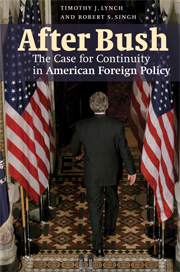Book contents
- Frontmatter
- Contents
- List of figures
- Acknowledgements
- Introduction: Winning the Second Cold War
- Chapter 1 Bush and the American foreign policy tradition
- Chapter 2 The constitution of American national security
- Chapter 3 The Second Cold War on Islamist terror: negative audits
- Chapter 4 The Second Cold War on Islamist terror: a positive audit
- Chapter 5 Iraq: Vietnam in the sand?
- Chapter 6 The Middle East: reformation or Armageddon
- Chapter 7 Frineds and foes after Bush
- Chapter 8 The emerging consensus at home and aborad
- Conclusion: The case for contiuity
- Notes
- Bibliography
- Index
Chapter 8 - The emerging consensus at home and aborad
Published online by Cambridge University Press: 22 September 2009
- Frontmatter
- Contents
- List of figures
- Acknowledgements
- Introduction: Winning the Second Cold War
- Chapter 1 Bush and the American foreign policy tradition
- Chapter 2 The constitution of American national security
- Chapter 3 The Second Cold War on Islamist terror: negative audits
- Chapter 4 The Second Cold War on Islamist terror: a positive audit
- Chapter 5 Iraq: Vietnam in the sand?
- Chapter 6 The Middle East: reformation or Armageddon
- Chapter 7 Frineds and foes after Bush
- Chapter 8 The emerging consensus at home and aborad
- Conclusion: The case for contiuity
- Notes
- Bibliography
- Index
Summary
Truth … has to be made by the rough process of a struggle between combatants fighting under hostile banners.
John Stuart Mill, On Liberty… is it so preposterous to suggest that a global ideology that justifies the use of limitless violence against civilians, and whose adherents are immensely inventive (if not always competent) in discerning methods of delivering that violence, could present an ‘existential’ threat?
David AaronovitchWhen Obama, in a speech on terrorism at the Wilson Center in Washington, said ‘If we have actionable intelligence about high-value terrorist targets (in Pakistan) and President Musharraf won't act, we will,’ he came under attack not only from Hillary Clinton but also from Senators Joseph Biden and Christopher Dodd. It turned out, though, that their objection was not to what he said – which they agreed with – but to the undiplomatic indiscretion of saying it out loud.
Hendrik HertzbergThere's a warning sign on the road ahead
There's a lot of people saying we'd be better off dead
Don't feel like Satan but I am to them
So I try to forget it any way I can
Neil Young, ‘Rockin’ in the Free World' (1989)In this chapter we consider the future of American foreign policy and explain why its strategic shape is more likely to resemble rather than reject that established under Bush, regardless of who is president into the 2010s and beyond.
- Type
- Chapter
- Information
- After BushThe Case for Continuity in American Foreign Policy, pp. 256 - 288Publisher: Cambridge University PressPrint publication year: 2008



